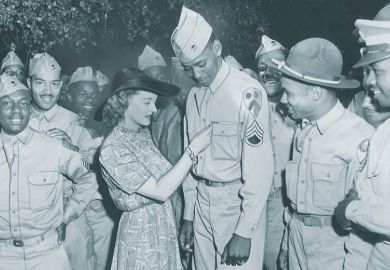Mamoun Hassan salutes Alexander Mackendrick, a mischievous film teacher.
Is it possible to teach film-making? When one thinks of the result of spending millions in Europe on screenwriting courses, the answer must be probably not. European cinema is hardly better now than in the days before failed American hacks came to tell us how to do it. They have blocked our minds with Lego constructs and phoney jargon and filled our TV and cinema screens with Hollywood fakes. Then along comes Alexander Mackendrick's On Film-Making , and one has to think again.
The book is the result of failure - the failure of an industry that could not accommodate the talents of one of Britain's greatest directors. The man who made Whisky Galore!, The Man in the White Suit, The Ladykillers and Sweet Smell of Success was effectively made redundant when he was at the height of his powers. Luckily for generations of film-makers, he was offered a post as dean of film at the newly founded California Institute of the Arts (CalArts) in 1969. He became a film teacher. He made copious work notes - some with accompanying illustrations and storyboards - and a selection of these has been made for this book by Paul Cronin, who additionally writes a short introduction.
CalArts, like the film industry before it, did not know what they were getting. Mischief-making, which is at the heart of most of Mackendrick's films, was part of his unsettling charm. At Michael Balcon's Ealing Studios, where he was nourished and where he was happiest, he was a disturber of the peace. Balcon defined Ealing self-deprecatingly as a place "where a group of middle-class people made middle-class films", and Mackendrick and fellow iconoclast Robert Hamer ( Kind Hearts and Coronets ) pretended to go along with the ethos but actually went their own way. Their films are about as cosy as a porcupine. But I suspect that, secretly, Balcon liked that.
CalArts, on the other hand, was a free-wheeling institution, whose culture of doing one's own thing grew out of the protest movements of 1968.
Mackendrick fazed them by talking about discipline and endeavour. He was a traditionalist among radicals - just as he was a radical among traditionalists back in the UK. He was at his most comfortable when he did not quite fit in, which is not surprising when you consider that he was born in the US, educated in Scotland (where he trained to be a commercial artist) and worked in England.
When Mackendrick took over at CalArts, there were few film schools. Until then, training had been through ad hoc apprenticeship in the big studios.
When that system collapsed, film schools emerged to take over.
In the Soviet bloc, training was long established in the great schools of VGIK in Moscow, FAMU in Prague and Lodz in Poland. They had a theoretical basis for their curriculum; our schools did not even have a curriculum.
Mackendrick was inventing the training of directors and screenwriters from zero.
His notes are a way of thinking aloud. He examined the films he admired and looked at his own work to recall and excavate his reasons for doing what he did. The more he dug, the more convinced he was that "film-writing and directing cannot be taught, only learnt, and each man or woman has to learn it through his or her own system of self-education". So, what was he doing? Well, he was influencing their system of self-education.
The question that bedevilled him, and still bedevils us, is this: are there rules? Mackendrick cannot make up his mind. He says yes, he says no, he says absolutely not, and he says maybe there are some rules but forget them if you are doing OK without them. What he does is to raise questions that a fledgling director or film writer should consider. His notes represent the musings and thoughts of a highly intelligent man and a fine film-maker who is preparing for his next film. Realistically, there was no future in that direction, but the tone and urgency of his writing suggest that film-making is a live issue. He both looks back and forwards.
At no point is there a sense of a great man sitting on his laurels. On the contrary, years after Mackendrick had finished his last film, he was still smarting over his mistakes. For instance, when he criticises subplots and how overused they were at Ealing - "All of the characters became essentially cameo roles that couldn't be developed" - he cites his own Whisky Galore! as a bad example.
He writes copiously about Sweet Smell of Success not because "it is an important work. It isn't" but, among other things, because of "the gutter poetry of (Clifford) Odets's melodramatic lines". Mackendrick takes a swipe at himself: "In a number of ways Sweet Smell of Success does seem ludicrously hammy and theatrical."
When he berates students for avoiding problems of dramatic construction by escaping to the "easier" problems of shooting, his comments do not come from a great height but from a fellow toiler. He describes how he focused on the shooting of Sweet Smell of Success because he hoped to conceal fundamental flaws by "fancy footwork of visual effects".
Still, for Mackendrick all the problems and opportunities start and end in the script. One of the most thrilling things in the book is a comparison of the same scene, written by Ernest Lehman and then redrafted by Odets. It is worth the price of the book on its own. If you don't learn about film-writing from this, do something else - become a critic.
Mackendrick may have been essentially modest, or maybe he was a perfectionist, but he was no saint.
The first time I met him he was on a short (and, it turned out, last) visit to the UK to teach at the National Film and Television School. I mentioned that the students and I had analysed some scenes from The Man in the White Suit and were surprised to discover that the film was about the atom bomb.
He turned on me and shouted: "Any fool can see that!" I consulted some other fools but, no, there was no mention of the bomb. He confirms in the book that he wanted to make a film about the lack of social and political responsibility of the scientists who developed nuclear fission. He knew he would not get backing for a serious drama, so he collaborated with Roger MacDougall to adapt and transform one of the latter's plays into one of the greatest comedies in British cinema.
He knew enough about the problems of "theme" - the thing that gives unity and meaning to the whole - to tackle it head on. Most film teachers have taken their cue from imported gurus and insist on finding or, more likely, imposing a theme from the start. I agree with Mackendrick that this is destructive theory. The intention may be to focus the writer's attention, but it also hems in his imaginative world, encourages tendentiousness, reduces the scope of dialogue and leads to a rigid and mechanical structure with no give in it. Don't try too hard, he says, to find the theme - it will find you. You need to trust yourself that the theme will emerge organically.
Mackendrick explored the painful post-war period of adjustment through comedy. The audiences loved him; the critics' admiration was more muted.
For some reason, comedy has a lower status than drama. But because comedy deals with exaggerated characters and stark differences where power struggles are played out in an obvious way, the choreography of the relationships within the frame is crucial. It requires greater control of mis-en-sc ne. The comparative importance of the characters must be clearly defined.
And this is where Mackendrick's initial training at the Glasgow School of Art comes in handy. He uses storyboards to dissect and explain such scenes.
His illustrations have a charm all of their own, and they are better than using still frames because he can concentrate two or three shots into one to make his point. It is one of the many pleasures of the book.
Cronin has done us a service in putting together Mackendrick's thoughts and ideas. The book is almost a film school. Mackendrick touches on every aspect of the craft and art of film-making.
And Mackendrick was such fun. An NFTS student saw him coming out of the preview theatre where he had viewed a rough cut of Terence Davies' Madonna and Child . "It's a gay movie, Sandy, isn't it?" Absolutely deadpan, Mackendrick replied: "Not at the moment."
In the end a fine teacher teaches more than a subject. He teaches what he is.
Mamoun Hassan was formerly head of directing at the National Film and Television School and taught at CalArts. He recently co-wrote and produced Mahcuca , a Chilean film by Andres Wood soon to be released in the UK.
On Film-Making: Alexander Mackendrick
Editor - Paul Cronin
Publisher - Faber
Pages - 336
Price - £25.00
ISBN - 0 571 21561 0
Register to continue
Why register?
- Registration is free and only takes a moment
- Once registered, you can read 3 articles a month
- Sign up for our newsletter
Subscribe
Or subscribe for unlimited access to:
- Unlimited access to news, views, insights & reviews
- Digital editions
- Digital access to THE’s university and college rankings analysis
Already registered or a current subscriber? Login



